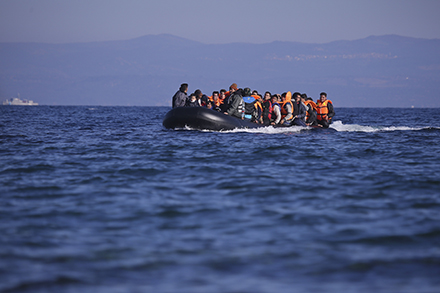The home affairs ministers of five European countries - Belgium, France, Germany, the Netherlands and the United Kingdom - agreed in London on Tuesday to do more to combat migrant smuggling networks, which were also the subject of a bilateral plan signed the day before by London and Berlin.
At the end of Tuesday's meeting of the ‘Calais group,’ the ministers committed themselves to five priority actions for 2025 to try to curb illegal crossings of the English Channel, the British Home Office said in a press release.
These actions will include organising awareness campaigns in the countries of departure to dissuade would-be emigrants, jointly targeting the networks supplying smugglers with boats and other equipment, tackling the funding of these networks, and combating their use of social networks to attract migrants.
The fifth action involves strengthening the five countries' operational cooperation on the ground, involving other partners such as the European Border and Coast Guard Agency, Frontex.
On the eve of the meeting, which was also attended by representatives of the European Commission, Frontex and Europol, London and Berlin signed a joint action plan to combat smuggling networks.
The agreement will increase the parties' ability to cooperate and to disrupt more organised criminal gangs, Angela Eagle, the UK's Minister of State for Border Security and Asylum, said on Sky News.
The Home Office said Germany intended to "clarify its legislation" to ensure that those helping to organise migrant crossings to the UK can be prosecuted, including those involved in the supply and storage of dinghies and motors.
Berlin "has agreed to examine whether the criminal provisions against offences relating to migrant smuggling need to be further clarified," said the German Interior Ministry.
German Interior Minister Nancy Faeser welcomed an agreement that will help "put an end to the inhumane activities of criminal organisations involved in migrant smuggling," acknowledging that "many of these crimes are planned in Germany."
The German ambassador in London, Miguel Berger, pointed out that the Britain's withdrawal from the European Union had complicated cooperation between EU countries and the UK in the fight against irregular immigration. "We are now trying to see how we can strengthen our cooperation again," he said on the BBC.
Nearly 34,000 people have arrived in the UK on makeshift boats since January, and at least 70 people have died so far in 2024, the deadliest year on record.
Labour Prime Minister Keir Starmer, who came to power in July, has pledged to reduce both regular and irregular immigration, criticising the "failure" of his Conservative predecessors in this regard.

